Entrepreneurial Motivation of Sir James Dyson
VerifiedAdded on 2023/01/16
|9
|2627
|32
AI Summary
This report discusses the entrepreneurial motivation of Sir James Dyson, the founder of Dyson Ltd. It explores the background of Dyson, his journey as an entrepreneur, and the factors that influenced his decision to become an entrepreneur. The report also highlights the importance of entrepreneurial motivation and how psychological, sociological, and economic factors play a role in driving entrepreneurial success.
Contribute Materials
Your contribution can guide someone’s learning journey. Share your
documents today.
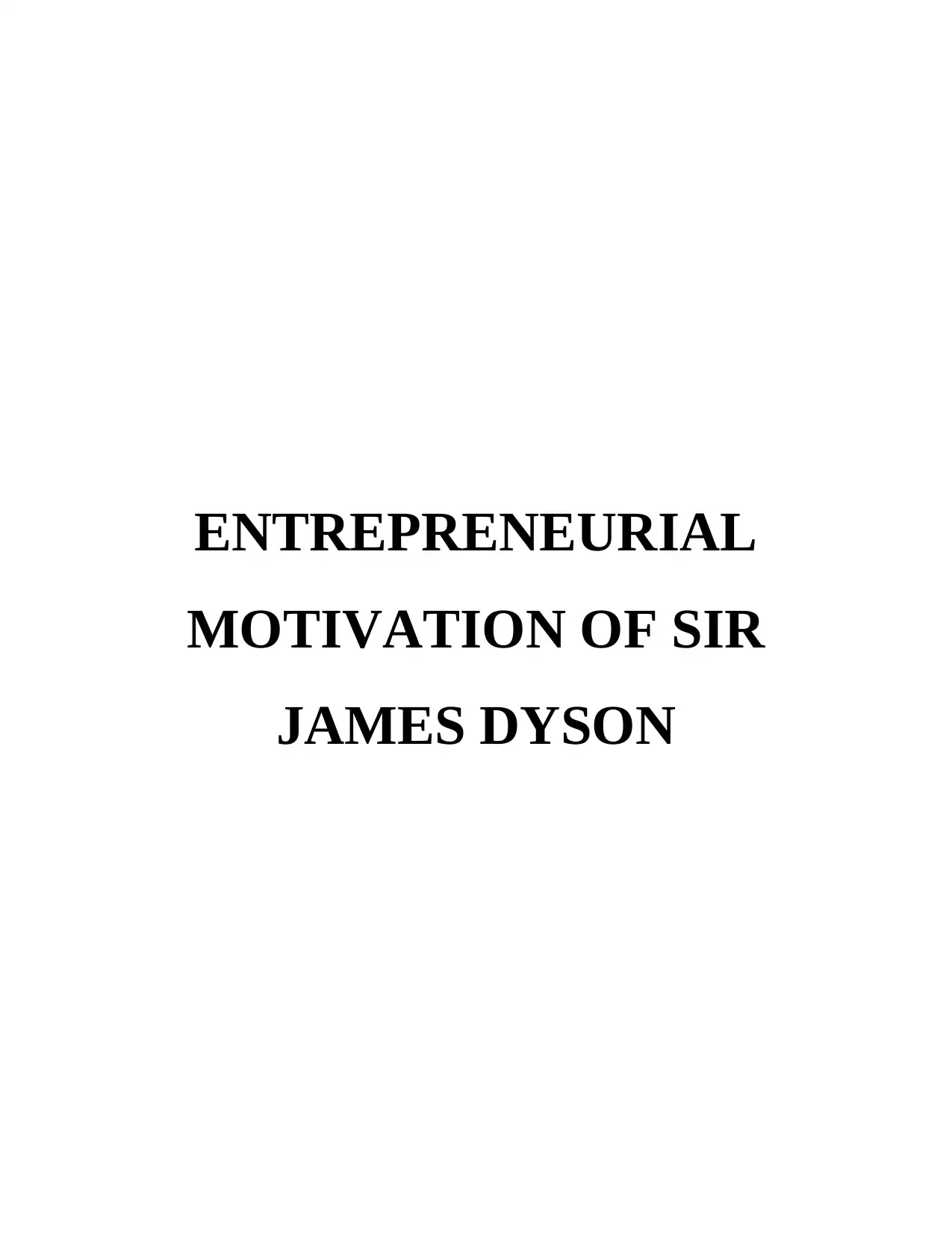
ENTREPRENEURIAL
MOTIVATION OF SIR
JAMES DYSON
MOTIVATION OF SIR
JAMES DYSON
Secure Best Marks with AI Grader
Need help grading? Try our AI Grader for instant feedback on your assignments.
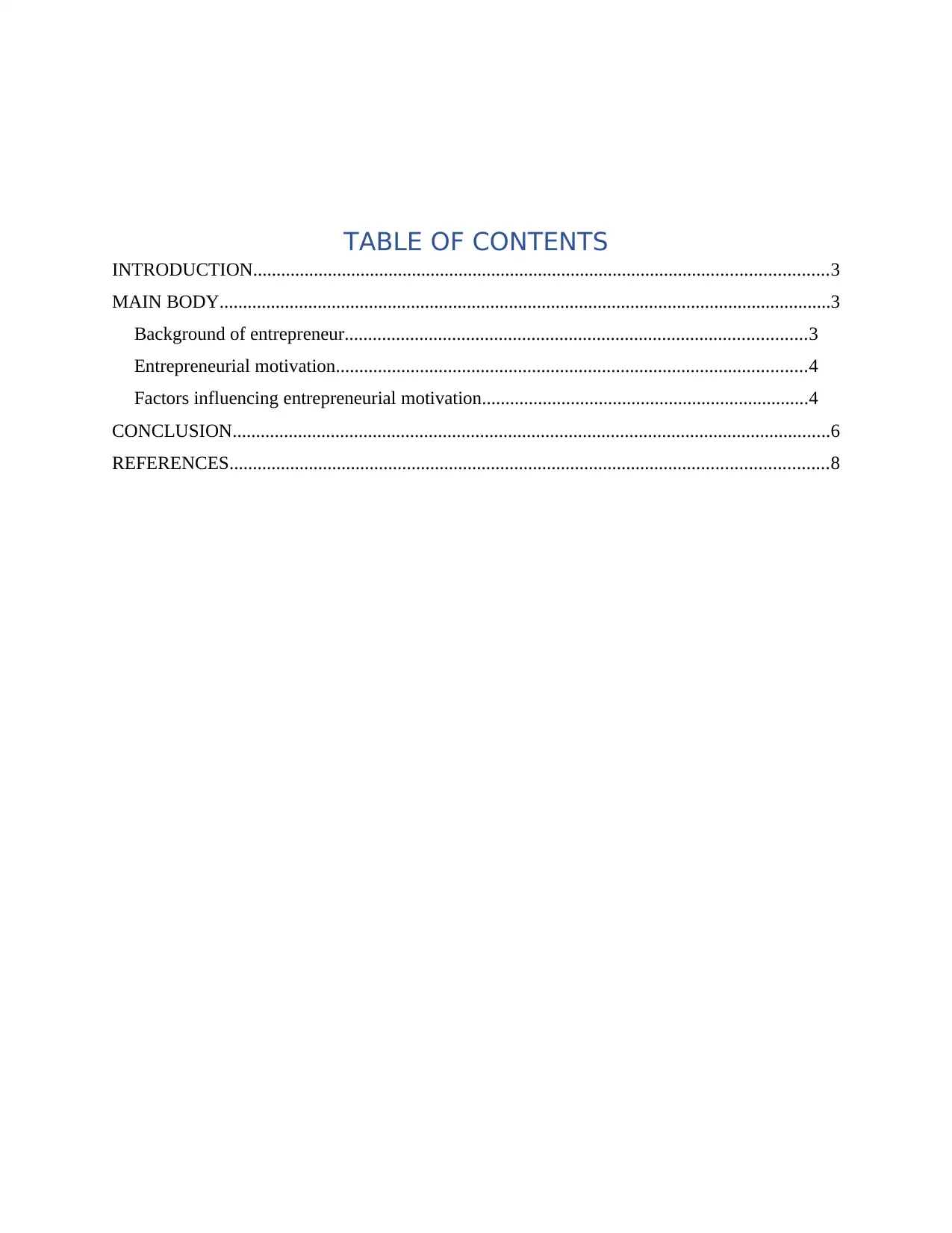
TABLE OF CONTENTS
INTRODUCTION...........................................................................................................................3
MAIN BODY...................................................................................................................................3
Background of entrepreneur...................................................................................................3
Entrepreneurial motivation.....................................................................................................4
Factors influencing entrepreneurial motivation......................................................................4
CONCLUSION................................................................................................................................6
REFERENCES................................................................................................................................8
INTRODUCTION...........................................................................................................................3
MAIN BODY...................................................................................................................................3
Background of entrepreneur...................................................................................................3
Entrepreneurial motivation.....................................................................................................4
Factors influencing entrepreneurial motivation......................................................................4
CONCLUSION................................................................................................................................6
REFERENCES................................................................................................................................8
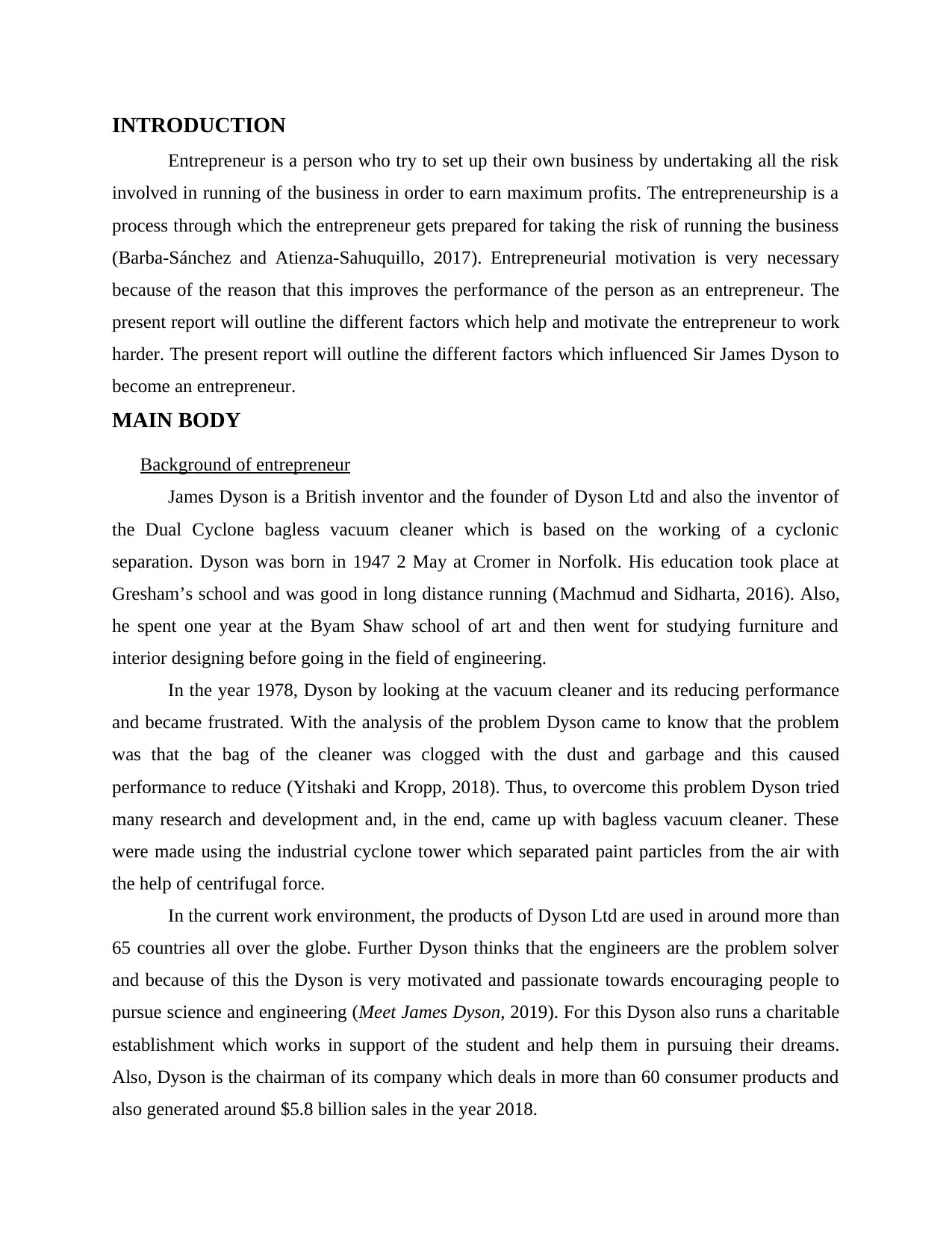
INTRODUCTION
Entrepreneur is a person who try to set up their own business by undertaking all the risk
involved in running of the business in order to earn maximum profits. The entrepreneurship is a
process through which the entrepreneur gets prepared for taking the risk of running the business
(Barba-Sánchez and Atienza-Sahuquillo, 2017). Entrepreneurial motivation is very necessary
because of the reason that this improves the performance of the person as an entrepreneur. The
present report will outline the different factors which help and motivate the entrepreneur to work
harder. The present report will outline the different factors which influenced Sir James Dyson to
become an entrepreneur.
MAIN BODY
Background of entrepreneur
James Dyson is a British inventor and the founder of Dyson Ltd and also the inventor of
the Dual Cyclone bagless vacuum cleaner which is based on the working of a cyclonic
separation. Dyson was born in 1947 2 May at Cromer in Norfolk. His education took place at
Gresham’s school and was good in long distance running (Machmud and Sidharta, 2016). Also,
he spent one year at the Byam Shaw school of art and then went for studying furniture and
interior designing before going in the field of engineering.
In the year 1978, Dyson by looking at the vacuum cleaner and its reducing performance
and became frustrated. With the analysis of the problem Dyson came to know that the problem
was that the bag of the cleaner was clogged with the dust and garbage and this caused
performance to reduce (Yitshaki and Kropp, 2018). Thus, to overcome this problem Dyson tried
many research and development and, in the end, came up with bagless vacuum cleaner. These
were made using the industrial cyclone tower which separated paint particles from the air with
the help of centrifugal force.
In the current work environment, the products of Dyson Ltd are used in around more than
65 countries all over the globe. Further Dyson thinks that the engineers are the problem solver
and because of this the Dyson is very motivated and passionate towards encouraging people to
pursue science and engineering (Meet James Dyson, 2019). For this Dyson also runs a charitable
establishment which works in support of the student and help them in pursuing their dreams.
Also, Dyson is the chairman of its company which deals in more than 60 consumer products and
also generated around $5.8 billion sales in the year 2018.
Entrepreneur is a person who try to set up their own business by undertaking all the risk
involved in running of the business in order to earn maximum profits. The entrepreneurship is a
process through which the entrepreneur gets prepared for taking the risk of running the business
(Barba-Sánchez and Atienza-Sahuquillo, 2017). Entrepreneurial motivation is very necessary
because of the reason that this improves the performance of the person as an entrepreneur. The
present report will outline the different factors which help and motivate the entrepreneur to work
harder. The present report will outline the different factors which influenced Sir James Dyson to
become an entrepreneur.
MAIN BODY
Background of entrepreneur
James Dyson is a British inventor and the founder of Dyson Ltd and also the inventor of
the Dual Cyclone bagless vacuum cleaner which is based on the working of a cyclonic
separation. Dyson was born in 1947 2 May at Cromer in Norfolk. His education took place at
Gresham’s school and was good in long distance running (Machmud and Sidharta, 2016). Also,
he spent one year at the Byam Shaw school of art and then went for studying furniture and
interior designing before going in the field of engineering.
In the year 1978, Dyson by looking at the vacuum cleaner and its reducing performance
and became frustrated. With the analysis of the problem Dyson came to know that the problem
was that the bag of the cleaner was clogged with the dust and garbage and this caused
performance to reduce (Yitshaki and Kropp, 2018). Thus, to overcome this problem Dyson tried
many research and development and, in the end, came up with bagless vacuum cleaner. These
were made using the industrial cyclone tower which separated paint particles from the air with
the help of centrifugal force.
In the current work environment, the products of Dyson Ltd are used in around more than
65 countries all over the globe. Further Dyson thinks that the engineers are the problem solver
and because of this the Dyson is very motivated and passionate towards encouraging people to
pursue science and engineering (Meet James Dyson, 2019). For this Dyson also runs a charitable
establishment which works in support of the student and help them in pursuing their dreams.
Also, Dyson is the chairman of its company which deals in more than 60 consumer products and
also generated around $5.8 billion sales in the year 2018.
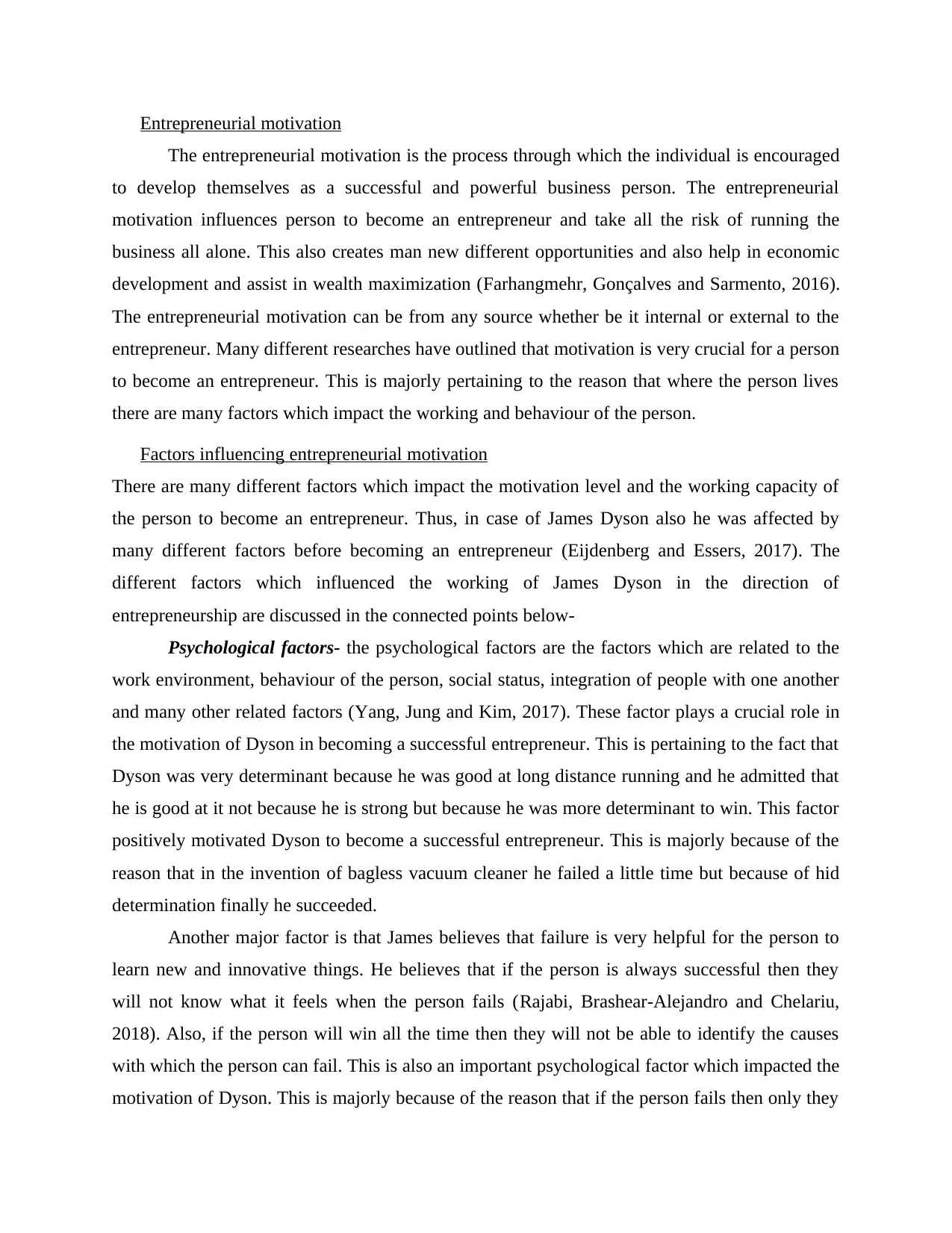
Entrepreneurial motivation
The entrepreneurial motivation is the process through which the individual is encouraged
to develop themselves as a successful and powerful business person. The entrepreneurial
motivation influences person to become an entrepreneur and take all the risk of running the
business all alone. This also creates man new different opportunities and also help in economic
development and assist in wealth maximization (Farhangmehr, Gonçalves and Sarmento, 2016).
The entrepreneurial motivation can be from any source whether be it internal or external to the
entrepreneur. Many different researches have outlined that motivation is very crucial for a person
to become an entrepreneur. This is majorly pertaining to the reason that where the person lives
there are many factors which impact the working and behaviour of the person.
Factors influencing entrepreneurial motivation
There are many different factors which impact the motivation level and the working capacity of
the person to become an entrepreneur. Thus, in case of James Dyson also he was affected by
many different factors before becoming an entrepreneur (Eijdenberg and Essers, 2017). The
different factors which influenced the working of James Dyson in the direction of
entrepreneurship are discussed in the connected points below-
Psychological factors- the psychological factors are the factors which are related to the
work environment, behaviour of the person, social status, integration of people with one another
and many other related factors (Yang, Jung and Kim, 2017). These factor plays a crucial role in
the motivation of Dyson in becoming a successful entrepreneur. This is pertaining to the fact that
Dyson was very determinant because he was good at long distance running and he admitted that
he is good at it not because he is strong but because he was more determinant to win. This factor
positively motivated Dyson to become a successful entrepreneur. This is majorly because of the
reason that in the invention of bagless vacuum cleaner he failed a little time but because of hid
determination finally he succeeded.
Another major factor is that James believes that failure is very helpful for the person to
learn new and innovative things. He believes that if the person is always successful then they
will not know what it feels when the person fails (Rajabi, Brashear-Alejandro and Chelariu,
2018). Also, if the person will win all the time then they will not be able to identify the causes
with which the person can fail. This is also an important psychological factor which impacted the
motivation of Dyson. This is majorly because of the reason that if the person fails then only they
The entrepreneurial motivation is the process through which the individual is encouraged
to develop themselves as a successful and powerful business person. The entrepreneurial
motivation influences person to become an entrepreneur and take all the risk of running the
business all alone. This also creates man new different opportunities and also help in economic
development and assist in wealth maximization (Farhangmehr, Gonçalves and Sarmento, 2016).
The entrepreneurial motivation can be from any source whether be it internal or external to the
entrepreneur. Many different researches have outlined that motivation is very crucial for a person
to become an entrepreneur. This is majorly pertaining to the reason that where the person lives
there are many factors which impact the working and behaviour of the person.
Factors influencing entrepreneurial motivation
There are many different factors which impact the motivation level and the working capacity of
the person to become an entrepreneur. Thus, in case of James Dyson also he was affected by
many different factors before becoming an entrepreneur (Eijdenberg and Essers, 2017). The
different factors which influenced the working of James Dyson in the direction of
entrepreneurship are discussed in the connected points below-
Psychological factors- the psychological factors are the factors which are related to the
work environment, behaviour of the person, social status, integration of people with one another
and many other related factors (Yang, Jung and Kim, 2017). These factor plays a crucial role in
the motivation of Dyson in becoming a successful entrepreneur. This is pertaining to the fact that
Dyson was very determinant because he was good at long distance running and he admitted that
he is good at it not because he is strong but because he was more determinant to win. This factor
positively motivated Dyson to become a successful entrepreneur. This is majorly because of the
reason that in the invention of bagless vacuum cleaner he failed a little time but because of hid
determination finally he succeeded.
Another major factor is that James believes that failure is very helpful for the person to
learn new and innovative things. He believes that if the person is always successful then they
will not know what it feels when the person fails (Rajabi, Brashear-Alejandro and Chelariu,
2018). Also, if the person will win all the time then they will not be able to identify the causes
with which the person can fail. This is also an important psychological factor which impacted the
motivation of Dyson. This is majorly because of the reason that if the person fails then only they
Secure Best Marks with AI Grader
Need help grading? Try our AI Grader for instant feedback on your assignments.
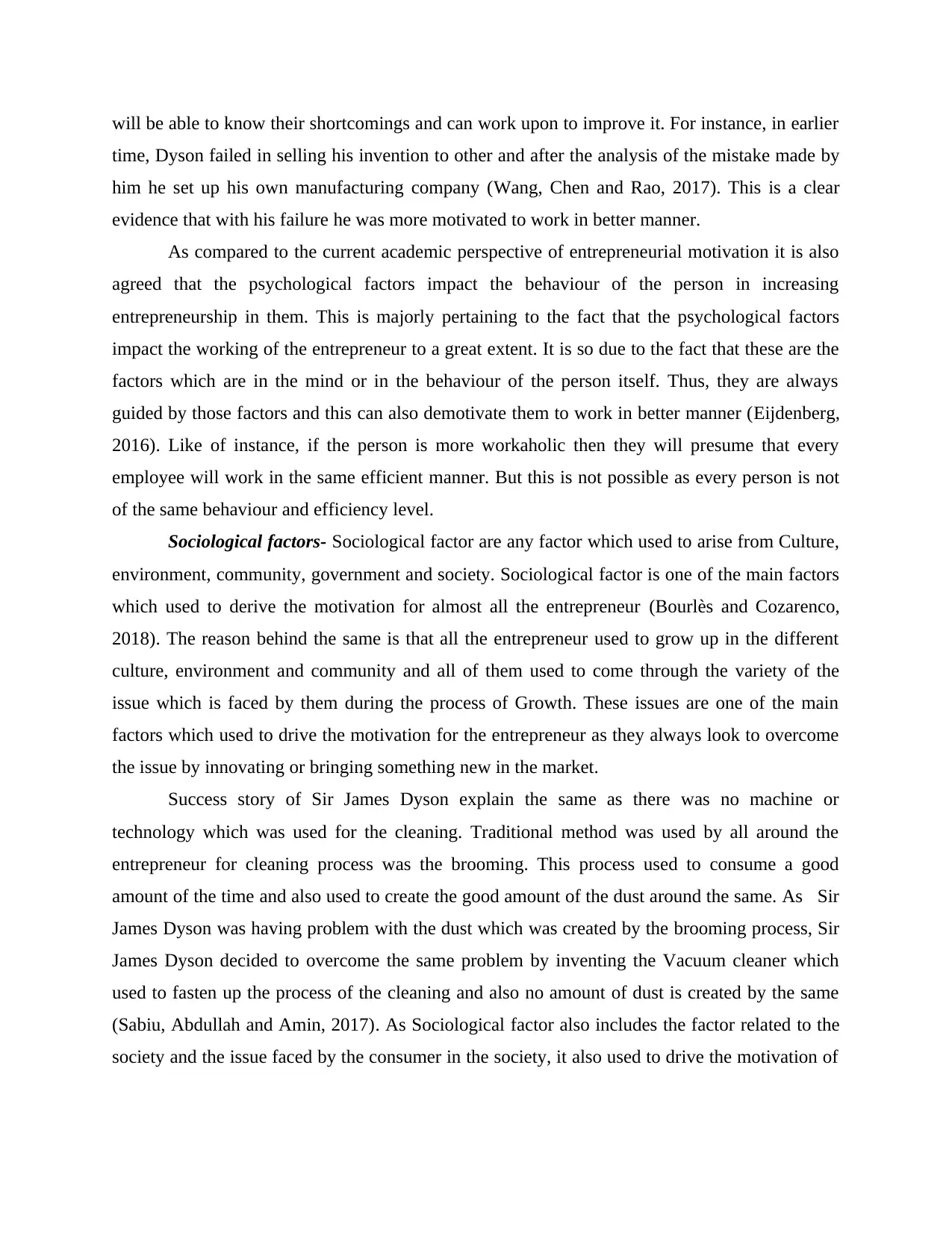
will be able to know their shortcomings and can work upon to improve it. For instance, in earlier
time, Dyson failed in selling his invention to other and after the analysis of the mistake made by
him he set up his own manufacturing company (Wang, Chen and Rao, 2017). This is a clear
evidence that with his failure he was more motivated to work in better manner.
As compared to the current academic perspective of entrepreneurial motivation it is also
agreed that the psychological factors impact the behaviour of the person in increasing
entrepreneurship in them. This is majorly pertaining to the fact that the psychological factors
impact the working of the entrepreneur to a great extent. It is so due to the fact that these are the
factors which are in the mind or in the behaviour of the person itself. Thus, they are always
guided by those factors and this can also demotivate them to work in better manner (Eijdenberg,
2016). Like of instance, if the person is more workaholic then they will presume that every
employee will work in the same efficient manner. But this is not possible as every person is not
of the same behaviour and efficiency level.
Sociological factors- Sociological factor are any factor which used to arise from Culture,
environment, community, government and society. Sociological factor is one of the main factors
which used to derive the motivation for almost all the entrepreneur (Bourlès and Cozarenco,
2018). The reason behind the same is that all the entrepreneur used to grow up in the different
culture, environment and community and all of them used to come through the variety of the
issue which is faced by them during the process of Growth. These issues are one of the main
factors which used to drive the motivation for the entrepreneur as they always look to overcome
the issue by innovating or bringing something new in the market.
Success story of Sir James Dyson explain the same as there was no machine or
technology which was used for the cleaning. Traditional method was used by all around the
entrepreneur for cleaning process was the brooming. This process used to consume a good
amount of the time and also used to create the good amount of the dust around the same. As Sir
James Dyson was having problem with the dust which was created by the brooming process, Sir
James Dyson decided to overcome the same problem by inventing the Vacuum cleaner which
used to fasten up the process of the cleaning and also no amount of dust is created by the same
(Sabiu, Abdullah and Amin, 2017). As Sociological factor also includes the factor related to the
society and the issue faced by the consumer in the society, it also used to drive the motivation of
time, Dyson failed in selling his invention to other and after the analysis of the mistake made by
him he set up his own manufacturing company (Wang, Chen and Rao, 2017). This is a clear
evidence that with his failure he was more motivated to work in better manner.
As compared to the current academic perspective of entrepreneurial motivation it is also
agreed that the psychological factors impact the behaviour of the person in increasing
entrepreneurship in them. This is majorly pertaining to the fact that the psychological factors
impact the working of the entrepreneur to a great extent. It is so due to the fact that these are the
factors which are in the mind or in the behaviour of the person itself. Thus, they are always
guided by those factors and this can also demotivate them to work in better manner (Eijdenberg,
2016). Like of instance, if the person is more workaholic then they will presume that every
employee will work in the same efficient manner. But this is not possible as every person is not
of the same behaviour and efficiency level.
Sociological factors- Sociological factor are any factor which used to arise from Culture,
environment, community, government and society. Sociological factor is one of the main factors
which used to derive the motivation for almost all the entrepreneur (Bourlès and Cozarenco,
2018). The reason behind the same is that all the entrepreneur used to grow up in the different
culture, environment and community and all of them used to come through the variety of the
issue which is faced by them during the process of Growth. These issues are one of the main
factors which used to drive the motivation for the entrepreneur as they always look to overcome
the issue by innovating or bringing something new in the market.
Success story of Sir James Dyson explain the same as there was no machine or
technology which was used for the cleaning. Traditional method was used by all around the
entrepreneur for cleaning process was the brooming. This process used to consume a good
amount of the time and also used to create the good amount of the dust around the same. As Sir
James Dyson was having problem with the dust which was created by the brooming process, Sir
James Dyson decided to overcome the same problem by inventing the Vacuum cleaner which
used to fasten up the process of the cleaning and also no amount of dust is created by the same
(Sabiu, Abdullah and Amin, 2017). As Sociological factor also includes the factor related to the
society and the issue faced by the consumer in the society, it also used to drive the motivation of
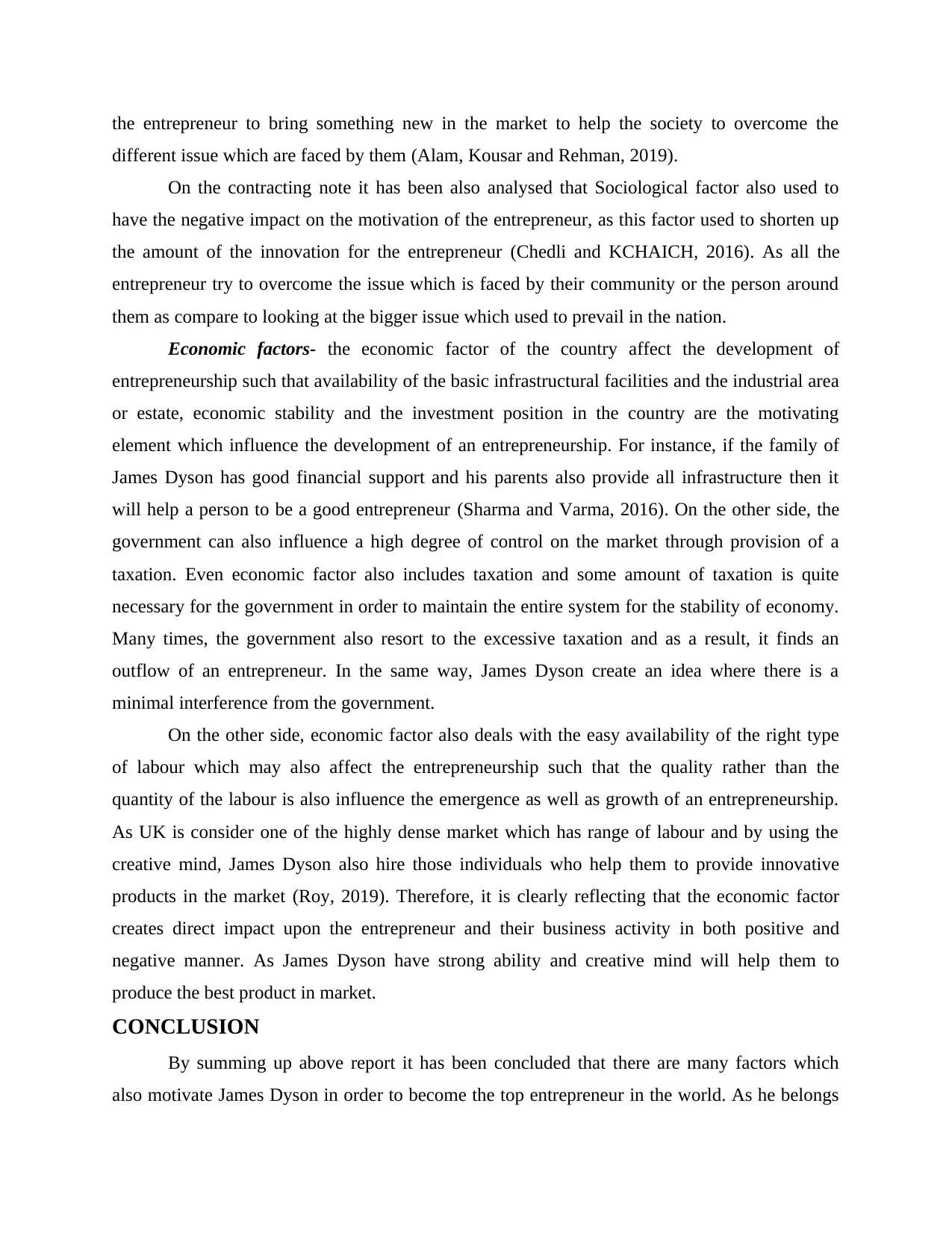
the entrepreneur to bring something new in the market to help the society to overcome the
different issue which are faced by them (Alam, Kousar and Rehman, 2019).
On the contracting note it has been also analysed that Sociological factor also used to
have the negative impact on the motivation of the entrepreneur, as this factor used to shorten up
the amount of the innovation for the entrepreneur (Chedli and KCHAICH, 2016). As all the
entrepreneur try to overcome the issue which is faced by their community or the person around
them as compare to looking at the bigger issue which used to prevail in the nation.
Economic factors- the economic factor of the country affect the development of
entrepreneurship such that availability of the basic infrastructural facilities and the industrial area
or estate, economic stability and the investment position in the country are the motivating
element which influence the development of an entrepreneurship. For instance, if the family of
James Dyson has good financial support and his parents also provide all infrastructure then it
will help a person to be a good entrepreneur (Sharma and Varma, 2016). On the other side, the
government can also influence a high degree of control on the market through provision of a
taxation. Even economic factor also includes taxation and some amount of taxation is quite
necessary for the government in order to maintain the entire system for the stability of economy.
Many times, the government also resort to the excessive taxation and as a result, it finds an
outflow of an entrepreneur. In the same way, James Dyson create an idea where there is a
minimal interference from the government.
On the other side, economic factor also deals with the easy availability of the right type
of labour which may also affect the entrepreneurship such that the quality rather than the
quantity of the labour is also influence the emergence as well as growth of an entrepreneurship.
As UK is consider one of the highly dense market which has range of labour and by using the
creative mind, James Dyson also hire those individuals who help them to provide innovative
products in the market (Roy, 2019). Therefore, it is clearly reflecting that the economic factor
creates direct impact upon the entrepreneur and their business activity in both positive and
negative manner. As James Dyson have strong ability and creative mind will help them to
produce the best product in market.
CONCLUSION
By summing up above report it has been concluded that there are many factors which
also motivate James Dyson in order to become the top entrepreneur in the world. As he belongs
different issue which are faced by them (Alam, Kousar and Rehman, 2019).
On the contracting note it has been also analysed that Sociological factor also used to
have the negative impact on the motivation of the entrepreneur, as this factor used to shorten up
the amount of the innovation for the entrepreneur (Chedli and KCHAICH, 2016). As all the
entrepreneur try to overcome the issue which is faced by their community or the person around
them as compare to looking at the bigger issue which used to prevail in the nation.
Economic factors- the economic factor of the country affect the development of
entrepreneurship such that availability of the basic infrastructural facilities and the industrial area
or estate, economic stability and the investment position in the country are the motivating
element which influence the development of an entrepreneurship. For instance, if the family of
James Dyson has good financial support and his parents also provide all infrastructure then it
will help a person to be a good entrepreneur (Sharma and Varma, 2016). On the other side, the
government can also influence a high degree of control on the market through provision of a
taxation. Even economic factor also includes taxation and some amount of taxation is quite
necessary for the government in order to maintain the entire system for the stability of economy.
Many times, the government also resort to the excessive taxation and as a result, it finds an
outflow of an entrepreneur. In the same way, James Dyson create an idea where there is a
minimal interference from the government.
On the other side, economic factor also deals with the easy availability of the right type
of labour which may also affect the entrepreneurship such that the quality rather than the
quantity of the labour is also influence the emergence as well as growth of an entrepreneurship.
As UK is consider one of the highly dense market which has range of labour and by using the
creative mind, James Dyson also hire those individuals who help them to provide innovative
products in the market (Roy, 2019). Therefore, it is clearly reflecting that the economic factor
creates direct impact upon the entrepreneur and their business activity in both positive and
negative manner. As James Dyson have strong ability and creative mind will help them to
produce the best product in market.
CONCLUSION
By summing up above report it has been concluded that there are many factors which
also motivate James Dyson in order to become the top entrepreneur in the world. As he belongs
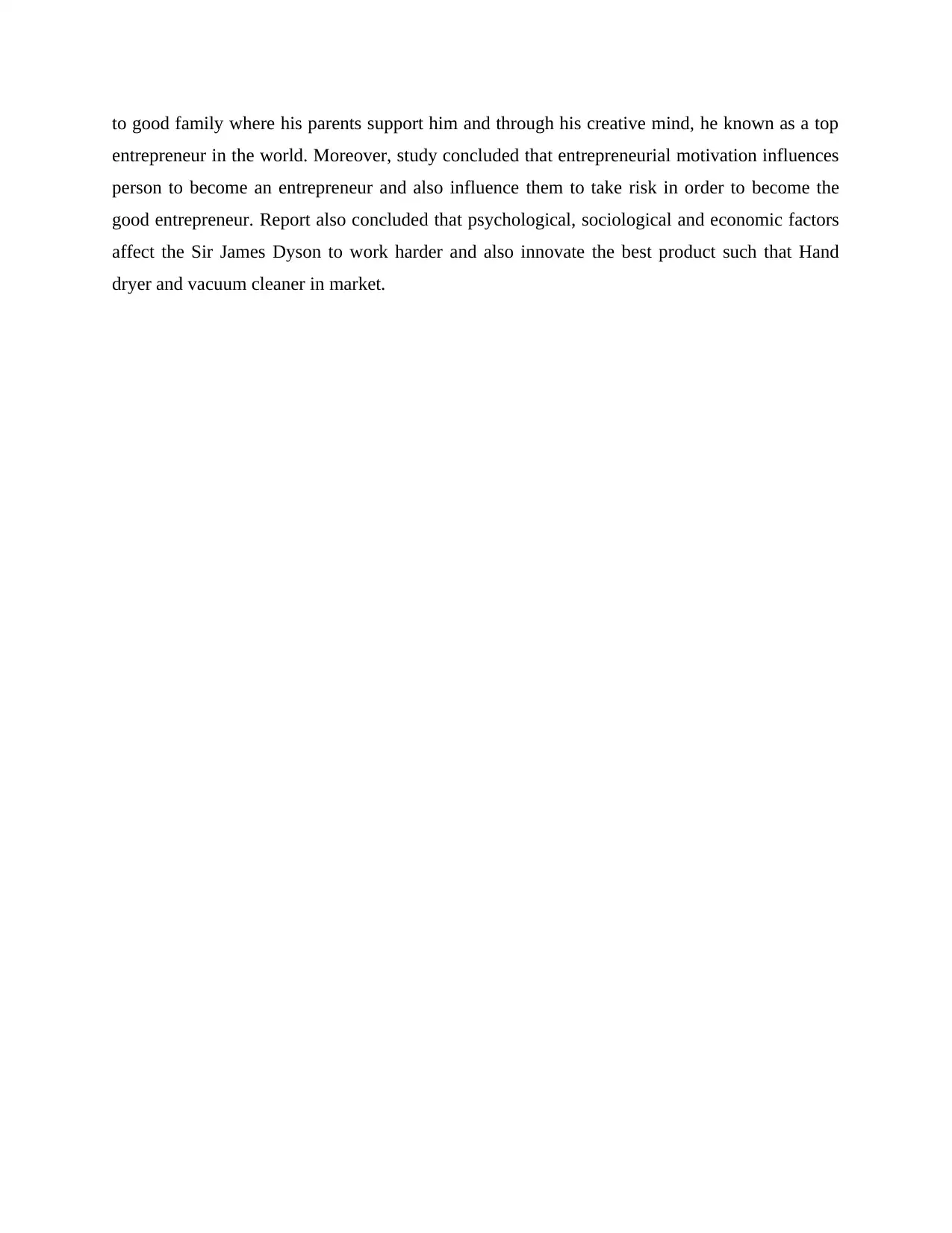
to good family where his parents support him and through his creative mind, he known as a top
entrepreneur in the world. Moreover, study concluded that entrepreneurial motivation influences
person to become an entrepreneur and also influence them to take risk in order to become the
good entrepreneur. Report also concluded that psychological, sociological and economic factors
affect the Sir James Dyson to work harder and also innovate the best product such that Hand
dryer and vacuum cleaner in market.
entrepreneur in the world. Moreover, study concluded that entrepreneurial motivation influences
person to become an entrepreneur and also influence them to take risk in order to become the
good entrepreneur. Report also concluded that psychological, sociological and economic factors
affect the Sir James Dyson to work harder and also innovate the best product such that Hand
dryer and vacuum cleaner in market.
Paraphrase This Document
Need a fresh take? Get an instant paraphrase of this document with our AI Paraphraser
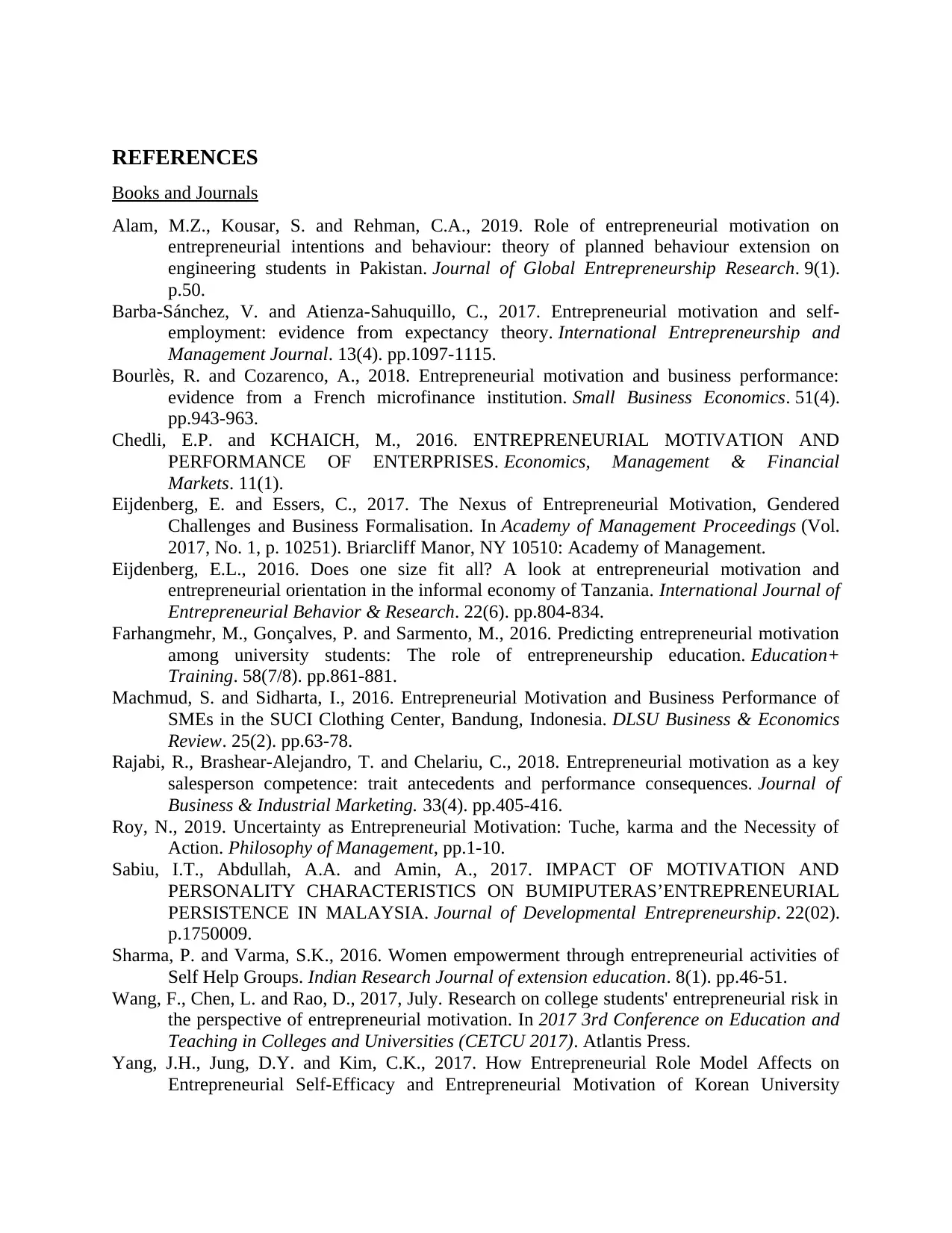
REFERENCES
Books and Journals
Alam, M.Z., Kousar, S. and Rehman, C.A., 2019. Role of entrepreneurial motivation on
entrepreneurial intentions and behaviour: theory of planned behaviour extension on
engineering students in Pakistan. Journal of Global Entrepreneurship Research. 9(1).
p.50.
Barba-Sánchez, V. and Atienza-Sahuquillo, C., 2017. Entrepreneurial motivation and self-
employment: evidence from expectancy theory. International Entrepreneurship and
Management Journal. 13(4). pp.1097-1115.
Bourlès, R. and Cozarenco, A., 2018. Entrepreneurial motivation and business performance:
evidence from a French microfinance institution. Small Business Economics. 51(4).
pp.943-963.
Chedli, E.P. and KCHAICH, M., 2016. ENTREPRENEURIAL MOTIVATION AND
PERFORMANCE OF ENTERPRISES. Economics, Management & Financial
Markets. 11(1).
Eijdenberg, E. and Essers, C., 2017. The Nexus of Entrepreneurial Motivation, Gendered
Challenges and Business Formalisation. In Academy of Management Proceedings (Vol.
2017, No. 1, p. 10251). Briarcliff Manor, NY 10510: Academy of Management.
Eijdenberg, E.L., 2016. Does one size fit all? A look at entrepreneurial motivation and
entrepreneurial orientation in the informal economy of Tanzania. International Journal of
Entrepreneurial Behavior & Research. 22(6). pp.804-834.
Farhangmehr, M., Gonçalves, P. and Sarmento, M., 2016. Predicting entrepreneurial motivation
among university students: The role of entrepreneurship education. Education+
Training. 58(7/8). pp.861-881.
Machmud, S. and Sidharta, I., 2016. Entrepreneurial Motivation and Business Performance of
SMEs in the SUCI Clothing Center, Bandung, Indonesia. DLSU Business & Economics
Review. 25(2). pp.63-78.
Rajabi, R., Brashear-Alejandro, T. and Chelariu, C., 2018. Entrepreneurial motivation as a key
salesperson competence: trait antecedents and performance consequences. Journal of
Business & Industrial Marketing. 33(4). pp.405-416.
Roy, N., 2019. Uncertainty as Entrepreneurial Motivation: Tuche, karma and the Necessity of
Action. Philosophy of Management, pp.1-10.
Sabiu, I.T., Abdullah, A.A. and Amin, A., 2017. IMPACT OF MOTIVATION AND
PERSONALITY CHARACTERISTICS ON BUMIPUTERAS’ENTREPRENEURIAL
PERSISTENCE IN MALAYSIA. Journal of Developmental Entrepreneurship. 22(02).
p.1750009.
Sharma, P. and Varma, S.K., 2016. Women empowerment through entrepreneurial activities of
Self Help Groups. Indian Research Journal of extension education. 8(1). pp.46-51.
Wang, F., Chen, L. and Rao, D., 2017, July. Research on college students' entrepreneurial risk in
the perspective of entrepreneurial motivation. In 2017 3rd Conference on Education and
Teaching in Colleges and Universities (CETCU 2017). Atlantis Press.
Yang, J.H., Jung, D.Y. and Kim, C.K., 2017. How Entrepreneurial Role Model Affects on
Entrepreneurial Self-Efficacy and Entrepreneurial Motivation of Korean University
Books and Journals
Alam, M.Z., Kousar, S. and Rehman, C.A., 2019. Role of entrepreneurial motivation on
entrepreneurial intentions and behaviour: theory of planned behaviour extension on
engineering students in Pakistan. Journal of Global Entrepreneurship Research. 9(1).
p.50.
Barba-Sánchez, V. and Atienza-Sahuquillo, C., 2017. Entrepreneurial motivation and self-
employment: evidence from expectancy theory. International Entrepreneurship and
Management Journal. 13(4). pp.1097-1115.
Bourlès, R. and Cozarenco, A., 2018. Entrepreneurial motivation and business performance:
evidence from a French microfinance institution. Small Business Economics. 51(4).
pp.943-963.
Chedli, E.P. and KCHAICH, M., 2016. ENTREPRENEURIAL MOTIVATION AND
PERFORMANCE OF ENTERPRISES. Economics, Management & Financial
Markets. 11(1).
Eijdenberg, E. and Essers, C., 2017. The Nexus of Entrepreneurial Motivation, Gendered
Challenges and Business Formalisation. In Academy of Management Proceedings (Vol.
2017, No. 1, p. 10251). Briarcliff Manor, NY 10510: Academy of Management.
Eijdenberg, E.L., 2016. Does one size fit all? A look at entrepreneurial motivation and
entrepreneurial orientation in the informal economy of Tanzania. International Journal of
Entrepreneurial Behavior & Research. 22(6). pp.804-834.
Farhangmehr, M., Gonçalves, P. and Sarmento, M., 2016. Predicting entrepreneurial motivation
among university students: The role of entrepreneurship education. Education+
Training. 58(7/8). pp.861-881.
Machmud, S. and Sidharta, I., 2016. Entrepreneurial Motivation and Business Performance of
SMEs in the SUCI Clothing Center, Bandung, Indonesia. DLSU Business & Economics
Review. 25(2). pp.63-78.
Rajabi, R., Brashear-Alejandro, T. and Chelariu, C., 2018. Entrepreneurial motivation as a key
salesperson competence: trait antecedents and performance consequences. Journal of
Business & Industrial Marketing. 33(4). pp.405-416.
Roy, N., 2019. Uncertainty as Entrepreneurial Motivation: Tuche, karma and the Necessity of
Action. Philosophy of Management, pp.1-10.
Sabiu, I.T., Abdullah, A.A. and Amin, A., 2017. IMPACT OF MOTIVATION AND
PERSONALITY CHARACTERISTICS ON BUMIPUTERAS’ENTREPRENEURIAL
PERSISTENCE IN MALAYSIA. Journal of Developmental Entrepreneurship. 22(02).
p.1750009.
Sharma, P. and Varma, S.K., 2016. Women empowerment through entrepreneurial activities of
Self Help Groups. Indian Research Journal of extension education. 8(1). pp.46-51.
Wang, F., Chen, L. and Rao, D., 2017, July. Research on college students' entrepreneurial risk in
the perspective of entrepreneurial motivation. In 2017 3rd Conference on Education and
Teaching in Colleges and Universities (CETCU 2017). Atlantis Press.
Yang, J.H., Jung, D.Y. and Kim, C.K., 2017. How Entrepreneurial Role Model Affects on
Entrepreneurial Self-Efficacy and Entrepreneurial Motivation of Korean University

Students?: Focused on Mediating Effects of Entrepreneurial Self-Efficacy. Korean
Business Education Review. 32(3). pp.115-136.
Yitshaki, R. and Kropp, F., 2018. 7 Revisiting entrepreneurial motivation and opportunity
recognition. A Research Agenda for Entrepreneurial Cognition and Intention, p.122.
Online
Meet James Dyson. 2019. [Online]. Available through:<
https://www.dyson.com.au/community/about-james-dyson.aspx>
Business Education Review. 32(3). pp.115-136.
Yitshaki, R. and Kropp, F., 2018. 7 Revisiting entrepreneurial motivation and opportunity
recognition. A Research Agenda for Entrepreneurial Cognition and Intention, p.122.
Online
Meet James Dyson. 2019. [Online]. Available through:<
https://www.dyson.com.au/community/about-james-dyson.aspx>
1 out of 9
Related Documents
Your All-in-One AI-Powered Toolkit for Academic Success.
+13062052269
info@desklib.com
Available 24*7 on WhatsApp / Email
![[object Object]](/_next/static/media/star-bottom.7253800d.svg)
Unlock your academic potential
© 2024 | Zucol Services PVT LTD | All rights reserved.





